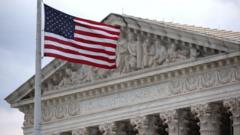The US Supreme Court's tie leaves a lower court ruling intact, preventing public funding for a proposed religious charter school in Oklahoma.
**Supreme Court Upholds Ruling Blocking Funding for Religious Charter School in Oklahoma**

**Supreme Court Upholds Ruling Blocking Funding for Religious Charter School in Oklahoma**
The justices split 4-4 in a high-stakes case challenging the boundaries of religious freedom and taxpayer funding.
In a significant ruling, the US Supreme Court has reached an impasse over the potential allocation of public funds to the nation's first religious charter school, a move that could have reshaped the educational landscape in Oklahoma. The justices evenly split 4-4 in their decision, effectively upholding a previous judgment from the Oklahoma State Supreme Court which determined that the school's establishment would breach constitutional guidelines prohibiting government establishment of religion.
The proposed charter school, which was set to be administered by the Catholic Archdiocese of Oklahoma City and the Diocese of Tulsa, aimed to secure approximately $23.3 million in state funding over five years. Charter schools combine public funding with private management, and while this ruling does not set a binding country-wide precedent, it sends a clear message regarding the limitations of taxpayer funding for religious institutions.
Justice Amy Coney Barrett, one of the more conservative members appointed by former President Donald Trump, recused herself from the case for unspecified reasons. The court's announcement came without detailed commentary, simply noting that the lower court's decision was affirmed due to the lack of majority support among the justices.
Reactions to the divided decision mirrored deep national divisions over religious freedom and taxpayer funding. Oklahoma Attorney General Gentner Drummond, who had initiated the lawsuit to revoke the school’s charter, welcomed the court's ruling as a triumph for religious liberties, asserting that it protects taxpayers from funding other religious schools while affirming constitutional principles.
Conversely, proponents of the charter school argued that the denial of public funding based on its religious affiliation constitutes discrimination against Christians. A spokesperson for the school expressed disappointment in the outcome, highlighting their commitment to educational choice for families and announcing efforts to explore alternatives for offering a virtual Catholic education.
The controversy around St. Isidore of Seville Virtual Catholic Charter School escalated swiftly following its approval by the Oklahoma State Virtual Charter School Board. While Governor Kevin Stitt endorsed the charter, Attorney General Drummond vehemently opposed it, illustrating a clear ideological divide in the state's approach to charter schooling—a movement that has gained traction among conservatives advocating increased parental control over educational options.
As discussions regarding the future of public funding and religious schooling continue, the Supreme Court's decision reaffirmed longstanding legal principles while leaving the door open for future challenges regarding the intersection of education and religious freedom in America's schools.






















